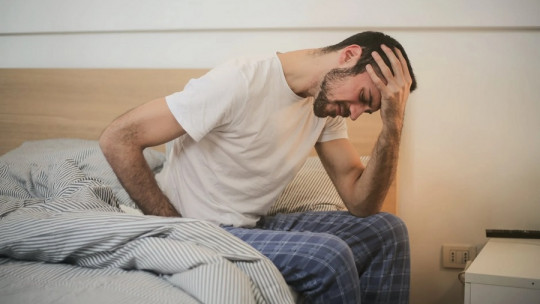
In many cases, physical pain such as headaches, gastrointestinal discomfort and back pain can have a psychological origin. These symptoms may actually be the somatization of a psychological disorder, such as depression.
Masked depression is one of the ways in which this disorder can present, only in a way that makes it seem like the main problem is physical. Apathy and sadness are hidden under the patient’s somatic complaints.
Below we will discover in more depth what masked depression is, what are the somatic symptoms that can be related to it and what explanation there is for it to manifest.
What is masked depression?
Our body is the faithful reflection of our mental state, and masked or somatoform depression is a clear example of how closely body and mind are related.
This type of depression is one in which The main symptom that the affected person complains about is not psychological, such as deep sadness or great apathy, but physical.. His depression is silenced by all the organic pain and discomfort that he experiences every day and it is these physical symptoms for which he seeks professional help.
The person is suffering a lot psychologically, but it is difficult for him to accept it, and he focuses on curing the physical problems about which he complains again and again. It is believed that almost 10% of people who go to Primary Care centers complaining of physical pain are actually suffering from depression and only half of them receive a proper diagnosis. The rest will go from doctor to doctor to see if they can solve their physical complaints, without much success, since, as we have indicated, the problem is not physical, but mental.
The person who suffers from somatoform depression uses a lot of resources and spends a lot of money to find out what is causing his physical discomfort.. You take all kinds of drugs prescribed (or not) by your doctor, such as anti-inflammatories, pain relievers, sleeping pills or antacids in the hope that the symptoms will disappear.
But despite giving all types of pills, there is rarely improvement, and the patient continues to go to all types of professionals. As both the pharmacological route and other routes focused on solving the organic fail, many call masked depression the “frustrating specialist” because, Until the psychological origin is raised, the physical symptoms do not disappear.
Symptoms
As one might expect, the psychological symptom of masked depression is apathy and pathological sadness. However, the person either does not seem to be aware of their psychological discomfort or the physical symptoms, a consequence of this disorder, focus their attention.
Physical symptoms further mask psychological discomfort And since on many occasions it is assumed that organic pain and discomfort are easier to solve, the person puts all their effort and resources into trying to solve them.
Among the most common physical symptoms of this type of depression, in which psychological discomfort is somatized, turning it into physical symptoms, we have:
Diagnostic problems
Diagnosing this type of depression is complicated because, as we have said, the physical symptoms hide the psychological discomfort. The person suffers mentally, but, by focusing on their physical discomfort, they often do not even report to their doctor that they are deeply depressed. This is why, since the patient does not indicate his emotional state, The professional rarely considers the hypothesis that the affected person’s physical discomfort is due to depression..
Fortunately, many doctors do consider that the patient’s physical discomfort is due to a psychological cause. This is especially raised when, after prescribing drugs to the patient, no improvement has been noted. The problem is that, although the doctor assumes that there is a psychological discomfort behind it that could explain it, the patient is reluctant to accept it. People who suffer from this disorder often do not connect with their feelings or emotions.
Furthermore, we live in a society in which, although there is increasing awareness about the importance of mental health, Not everyone recognizes that they have a psychological problem. Physical symptoms, such as back pain or stomach discomfort, suffer less stigmatization than psychological problems such as depression or anxiety. This means that many people with depression end up somatizing their psychological discomfort in the form of all kinds of physical discomfort.
Masked depression in children and the elderly
Masked depression seems to be very common in boys and girls. Infants do not have sufficient linguistic capacity or assertiveness to indicate that they feel deeply sad and apathetic, which can end up somatizing their psychological discomfort into all types of more obvious problems such as hyperactivity, aggressive behavior, antisocial behavior and disorders. of learning.
Some depressed children show their psychological discomfort by complaining, above all, of stomach pain or headaches.. Many suspected cases of hyperactivity, bedwetting, mood changes, eating problems, and behavioral problems could have their origins in depression.
Curiously, depression has been a diagnosis that has hardly been recognized in children. For much of the 20th century, it was thought that depression did not manifest itself in childhood. It was not until 1972 that it was proven that boys and girls could also suffer from this disorder, and it was recognized as a masked depression by psychiatrists Leon Cytryn and Donald H. McKnew. It is currently accepted that boys and girls can manifest both masked depression and the most obvious form of the disorder.
Masked depression also occurs in the elderly, but this does not have to be due to difficulties in recognizing that they are suffering from a psychological problem. On many occasions the physical symptoms of normal aging can be confused with the same physical symptoms that manifest in masked depression, causing doctors who treat the elderly to consider that, in reality, it is nothing more than any pain attributed to age.
However, this mentality should change. It has been stated that between 15% and 20% of the elderly population suffers from some psychiatric disorder and, of course, depression could be among them. This masked depression, regardless of whether it is because the patient does not want to recognize his psychological discomfort or because his physical problems cover up his mental disorder, is very harmful to the patient’s health and can accelerate his death.
The importance of diagnosis
As we have seen, we live in a society in which the physical is much less stigmatized than the psychological, having serious consequences when seeking help. People seek professional care for stomach pain rather than depression, and it is also difficult for him to accept that he could suffer from a mental disorder. The only thing this does is aggravate the situation even more, making the help you need take longer to arrive and even making your psychological discomfort become chronic.
Fortunately, many times the professional sees what the true cause of the patient’s physical discomfort is, and motivates him to follow psychological treatment. This is where we can highlight the importance of diagnosis and treatment, since addressing the underlying psychological problem will greatly improve the patient’s health. He will improve physically and psychologically, acquiring strategies that allow him to manage his psychological discomfort and, consequently, acquiring healthier habits.
Understanding that not all physical problems have an organic origin is essential, since, as we have mentioned, 10% of patients who go to their doctor could be suffering from depression that causes their physical discomfort. It must be understood that an unhealthy mental state will negatively affect our physical health, and that one cannot expect to be healthy by only doing sports or eating a varied diet. Physical pain will never be cured if we do not cure psychological pain first.








